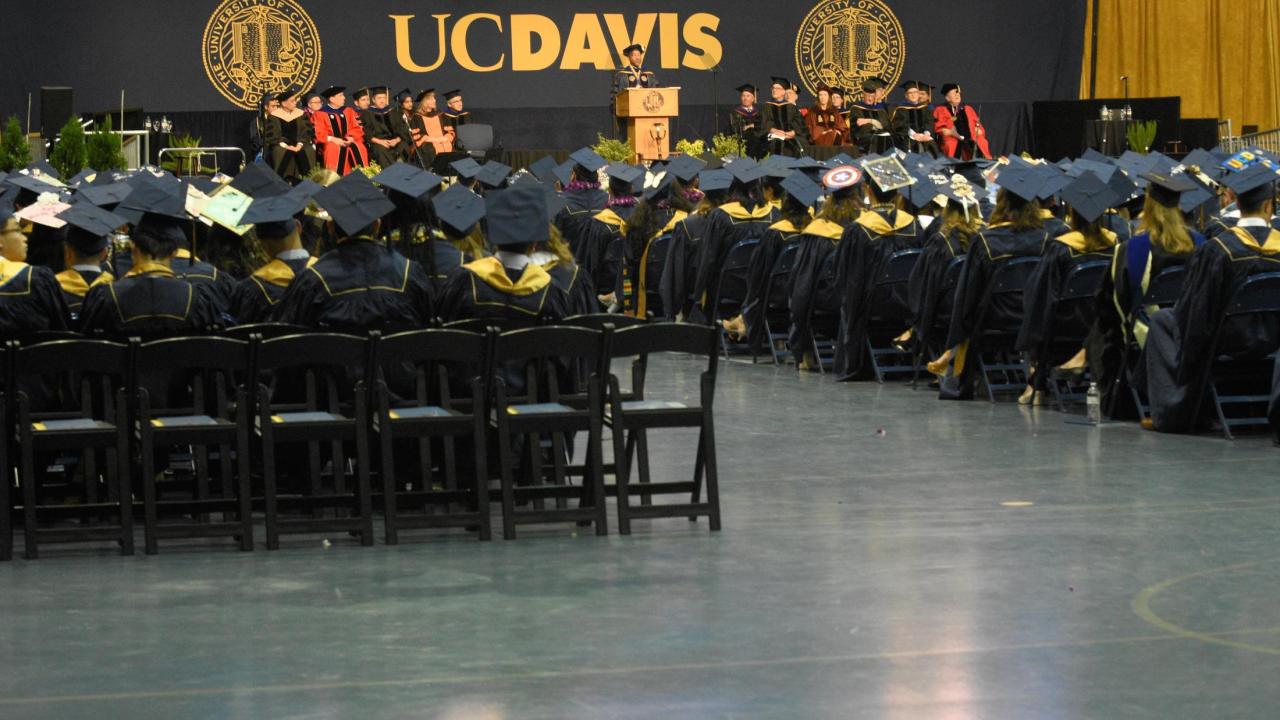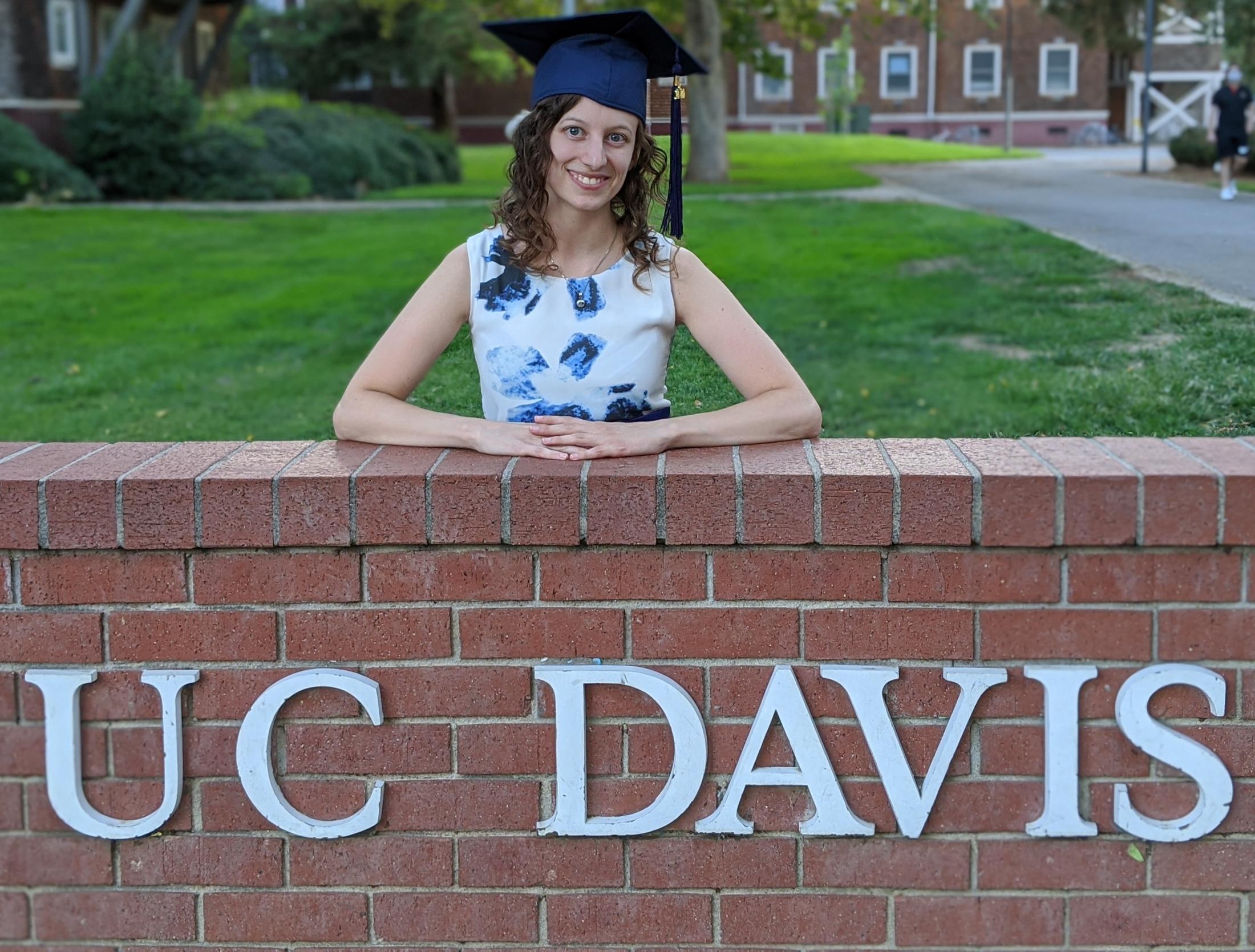
The Person Behind the Scientist: A Ph.D. Journey

It is finally here. After over six years of studying, pipetting, writing, pipetting, teaching, pipetting, planning, pipetting, troubleshooting, pipetting, attending meetings, pipetting, mentoring and then some more pipetting, the letter stating I have completed all requirements to be awarded a Doctorate of Philosophy in Microbiology from UC Davis has arrived. It will be a couple more months until the final diploma comes through the mail and there are still some manuscripts pending review to be published. However, I have reached this critical milestone despite a pandemic, a broken leg and many experimental hiccups.
This is an excellent moment to reflect on my research-intensive journey (that took about one-fifth of my life) now that I’ve arrived at the finish line.
Although a science Ph.D. student may be seen as someone in a lab coat working long hours at the bench on a specialized research topic, there is so much more to the whole experience. There are many paths to the ultimate degree, which is not entirely understood by the public and can generate controversy over who should be called a doctor. To give an example, Einstein himself followed an unconventional path. While my journey involved experimental work inside a laboratory, Einstein’s dissertation was theoretical and apparently written while holding a non-academic job at a patent office. I had not even decided on my dissertation topic until the middle of my second year in the program and it took a lot of bench work (pipetting!) to complete it. This is an excellent reminder that different times, fields and universities have varying requirements to confer a doctorate. Here, I will tell my story and experiences.
There is an inherently high risk of failing due to the nature of trying to prove or disprove a hypothesis. In my opinion, this constant risk of failure is a strong driver for depression and anxiety in Ph.D. students. Provided with the right environment, a Ph.D. student will develop resilience to overcome their lab-induced depression or anxiety. I found solace by realizing that life-work balance was essential for me. There are many opportunities outside the lab that can improve this balance as well as provide more skill-building opportunities.
One of the programs I joined was the designated emphasis in biotechnology (DEB). The DEB program encourages volunteer and outreach work, like participating in Picnic Day, both of which are great ways to share science outside of academia. Through this program I also completed a summer internship at Novozymes. It was valuable industry experience as well as enough of a break from my own research that I was able to return refreshed and with a new perspective. I strongly recommend getting experience outside academia to my friends, colleagues, students and mentees.
Many graduate students will also teach at some point during their program. Although I taught within my field (genetics), I also had a unique opportunity to teach first-year students through Career Discovery Groups. The program allowed me to improve my teaching and mentoring skills, learn more about the university and its plethora of resources and about my own career preparation. The well-known saying “It’s when we teach that we learn the most” could not be more correct. Besides teaching, many graduate students will also mentor younger students at some point. They may be undergraduates, master students, or other Ph.D. students new to the lab. Teaching and mentoring others was one of the most rewarding aspects of my Ph.D. journey, and I celebrate my mentees as they continue to reach milestones on their journeys.
To continue to boost my life-work balance through non-research experiences, I immersed myself in Italian by auditing classes after my mandatory coursework was finished. It was an opportunity to interact with people outside of my field while taking advantage of one of many UCD resources to learn a new language. The nature of the classroom also meant I was pushed out of my comfort zone, and practiced communicating, both written and spoken.
Communication is a vital part of any career. Our lab group is composed of students from a range of backgrounds, from biology to computer science which requires effective communication to a broad audience during lab meetings or other correspondence. With the encouragement of my advisor, I participated in various Science Says events to improve and practice my communication. This included volunteering at North Bay Science Discovery Day and discussing science and science communication as part of their regular bookclub. Science Says also facilitated my attendance at communication workshops, including the “Visual Storytelling for Science Communication” with the participation of employees from the Pixar Animation Studio, which took place on the UC Berkeley campus in 2018. Joining the Science Says group provided valuable opportunities to improve my communication skills as well as help with work-life balance.
All the skills I acquired on my journey have prepared me for my next challenge: the job market. Teaching and mentoring at the CDG Program has provided me with tools to write better resumes and cover letters. Participating in the Science Says group and volunteering at outreach programs with the DEB has given me the confidence to talk about my work and better communicate my achievements. The DEB has also provided an opportunity to gain experience outside the academic world, which will be valuable in my transition to the biotech industry. Wish me luck!
Beatriz Pereira was a past Science Says leadership team member and has recently graduated from UC Davis with a Ph.D. in Microbiology.

Comments